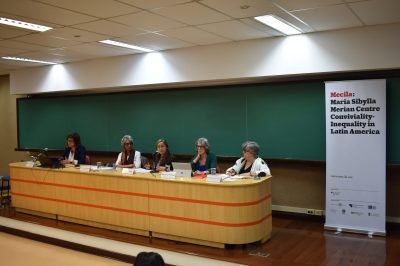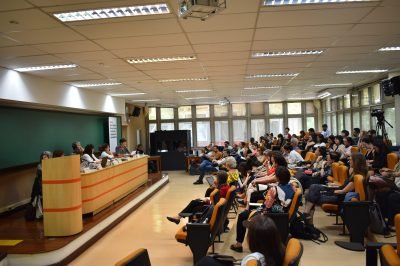Putting Care on the Political Agenda: International Symposium Care that Matters, Matters of Care
Global Convivial Forum
Raquel Rojas (Postdoctoral Investigador, Mecila-FU Berlin)
Roundtable: Care and Inequalities Across Time and Space with Barbara Potthast, Encarnación Gutiérrez-Rodríguez, Nadya Araujo Guimarães, Karina Batthyány and Raquel Rojas
The International Symposium Care that Matters, Matters of Care provided a unique platform to rethink the place of care in our societies. By bringing together experts from diverse fields and countries, it reaffirmed the critical role governments — within the G20 and beyond — must play in addressing care inequalities and building a just, equitable social organization of care.
Care is the foundation of human existence, yet it has historically been undervalued and relegated to the private sphere, disproportionately burdening women and girls. Feminist movements have long sought to bring care into the political realm, and recent years have seen significant progress, particularly in Latin America. A notable example is its inclusion in the G20’s latest discussions.
The International Symposium Care that Matters, Matters of Care took place on October 14–15, 2024, at the University of São Paulo (USP). Organized as part of Brazil’s G20 Presidency and the T20 discussions, it was hosted by Mecila with support from DWIH São Paulo and USP’s International Cooperation Office (Aucani). The event brought together researchers, policymakers, and civil society representatives to discuss care policies as tools for addressing intersecting inequalities.
The symposium began with a welcome address featuring Nina von Sartori (German Embassy in Brasília), Sérgio Proença (Aucani), Adrián Lavalle (CEBRAP), Marcio Weichert (DWIH São Paulo), and Sérgio Costa (Mecila). The opening roundtable examined the interplay between care and inequalities, exploring its historical roots and global connections. Barbara Potthast (University of Cologne) discussed key aspects of the social organization of care in Latin America over time. Nadya Araujo Guimarães (USP) highlighted the region’s contributions to conceptualizing care and developing the field. Karina Batthyány (CLACSO/UdelaR) presented insights into Uruguay’s Sistema Nacional Integrado de Cuidados, the first care system in the region, showcasing its successes and challenges, and Encarnación Gutiérrez-Rodríguez (University of Frankfurt) explored the interconnections between care regimes in Europe and Latin America, emphasizing care chains and migration.

The second day began with the panel “Making Care Visible,” which focused on care’s diverse aspects across life cycles and social structures. Priscila Vieira (CEBRAP) discussed elder care in São Paulo, highlighting caregivers’ physical and emotional burdens, social isolation, and mistrust of the state. Eugenia Rausky (CONICET/UNLP) offered an anthropological perspective on childhood, revealing how children in lower-income households often provide care, challenging traditional narratives of children as solely care recipients. Talja Blokland (Humboldt University) addressed the complexities of state care programs, emphasizing the tensions between trust-building with beneficiaries and bureaucratic professionalism. Landy Sánchez (El Colegio de México) presented an innovative analysis of how climate change exacerbates care crises, spotlighting the intersection of two global challenges. Commentators Luiza Nassif Pires (UNICAMP) and Eugenia Brage (CONICET/PAGU) enriched the discussion, bridging diverse perspectives.
A subsequent panel explored strategies to politicize care and the impact of the COVID-19 pandemic in exposing inequalities. Raquel Rojas (FU Berlin) and Laura Flamand (El Colegio de México) presented a comparative study of impacts of the pandemic on inequalities, emphasizing the effects of diverse care provision models. Eryka Galindo (University of Heidelberg) examined the pandemic’s impact on food security in Brazil, linking household-level care to public policies and multinational corporate practices. Regina Vieira (UNIFESP) addressed the challenges of adapting global care policy indexes to heterogeneous contexts, while Jana Silverman (UFABC) highlighted the struggles and resilience of Brazil’s domestic workers, a key pillar of care provision in the region. Discussants Miriam Nobre (Siempreviva Organização Feminista) and Izadora Xavier do Monte (Mecila) provided critical perspectives on these issues.

Panel I: Making care visible with Priscila Vieira, María Eugenia Rausky, Talja Blokland, Landy Sánchez, Bianca Tavolari, Luiza Nassif Pires and Eugenia Brage
The final panel explored policy approaches in Latin America to recognize and redistribute care responsibilities. Mariana Mazzini Marcondes (Secretaria Nacional da Política de Cuidados e Família) shared Brazil’s experience advancing a care policy through active civil society participation. Laura Pautassi (CONICET/UBA) emphasized the importance of recognizing care as a universal right and shared regional milestones toward this goal. Patricia Cossani Padilla (UN Women) highlighted the need to integrate care into normative frameworks to ensure sustained progress beyond political cycles. Closing remarks by Guita Grin Debert (UNICAMP) and Lorena Hakak (FGV RI) underscored the importance of embedding care as a transversal element in public policy.
Overall, the International Symposium Care that Matters, Matters of Care provided a unique platform to rethink the place of care in our societies. By bringing together experts from diverse fields and countries, it reaffirmed the critical role governments—within the G20 and beyond—must play in addressing care inequalities and building a just, equitable social organization of care.
Mecila researchers also had the opportunity to meet with Germany’s Federal Minister for Family Affairs, Senior Citizens, Women and Youth, Lisa Paus, who attended the G20 Gender Equality Ministerial Meeting in Brasília in early October. Their discussions focused on the outcomes of the International Care Symposium and highlighted the urgent need for states to work towards a more equitable distribution of care and the contributions of academia to this task.
Watch the whole event now on the Mecila YouTube channel.
Images by Vitória Zandonadi and Iris Brochsztain.
